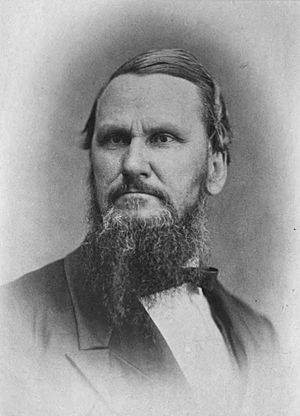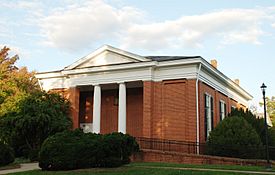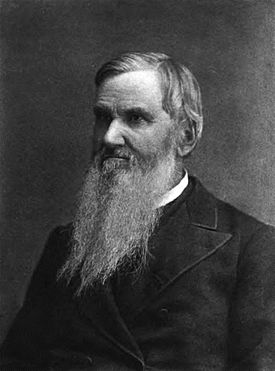Robert Lewis Dabney facts for kids
Quick facts for kids
Robert Lewis Dabney
|
|
|---|---|
 |
|
| Born |
Robert Lewis Dabney
March 5, 1820 |
| Died | January 3, 1898 (aged 77) |
| Resting place | Union Presbyterian Seminary Cemetery Hampden-Sydney, Virginia |
| Nationality | American |
| Education | Hampden-Sydney College University of Virginia Union Theological Seminary |
| Occupation |
|
| Parent(s) | Charles Dabney Elizabeth Randolph Price Dabney. |
| Signature | |
Robert Lewis Dabney (March 5, 1820 – January 3, 1898) was an American Christian theologian, Southern Presbyterian pastor, Confederate States Army chaplain, and architect. He was also chief of staff and biographer to Stonewall Jackson. His biography of Jackson remains in print today.
Dabney and James Henley Thornwell were two of Southern Presbyterianism's most influential scholars. They were both Calvinist, Old School Presbyterians, and social conservatives. Some conservative Presbyterians, particularly within the Presbyterian Church in America and the Orthodox Presbyterian Church, still value their theological writings, although both these churches have repudiated Dabney's and Thornwell's beliefs on race and support of antebellum slavery.
Contents
Biography
Early life
Robert Lewis Dabney was born on March 5, 1820. He was the sixth child (third son) of Charles William Dabney (1786–1833) and Elizabeth Randolph Price Dabney, and a descendant of Cornelius d'Aubigné from an extended d'Aubigné (Dabney) Huguenot family that settled in Virginia and Massachusetts in the 17th century. [See "Origin of the Dabney Family of Virginia," Virginia Magazine of History and Biography, Vol. XLV, April 1937, No. 2, which disproves this. The Virginia progenitor of this line was present in Virginia before the Edict of Nantes, which started the Huguenot exodus] His brother, Charles William Dabney (1809–1895) was the captain of Company C, 15th Virginia Infantry Regiment.
He graduated from Hampden-Sydney College with a Bachelor of Arts degree in 1837, and received a master's degree from the University of Virginia in 1842. He graduated from Union Theological Seminary in 1846.
Career
He served as a missionary in Louisa County, Virginia, from 1846 to 1847 and pastor at Tinkling Spring Presbyterian Church from 1847 to 1853, being also head master of a classical school for a portion of this time. He is considered a distinguished son of Providence Presbyterian Church. It was at Tinkling Spring that he met Margaret Lavinia Morrison. They were married on March 28, 1848. They had six sons together, three of whom died in childhood from diphtheria (two in 1855, the other in 1862). From 1853 to 1859, he was professor of ecclesiastical history and polity and from 1859 to 1869 adjunct professor of systematic theology in Union Theological Seminary, where he later became full professor of systematics. In 1883, he was appointed professor of mental and moral philosophy in the University of Texas.
Dabney defended the biblical "righteousness" of slavery and opposed public schools. In the 1870s, he wrote that it was unjust to tax "oppressed" white people to provide "pretended education to the brats of black paupers". He rejected "the Yankee theory of popular state education" and democratic government itself, which interfered with the liberty of the South.
By 1894, failing health compelled him to retire from active life, although he still lectured occasionally. He was co-pastor, with his brother-in-law B. M. Smith, of the Hampden-Sydney College Church 1858 to 1874, also serving Hampden-Sydney College in a professorial capacity on occasions of vacancies in its faculty. Dabney, whose wife was a third cousin to Stonewall Jackson's wife, participated in the American Civil War: during the summer of 1861 he was chaplain of the 18th Virginia Infantry in the Confederate army, and in the following year was chief of staff to Jackson during the Valley Campaign and the Seven Days Battles.
Architecture
Dabney's designs for the Tinkling Spring Presbyterian Church and for two other churches in Virginia are credited with influencing church architecture in Virginia. Three works associated with Dabney are listed on the U.S. National Register of Historic Places: Tinkling Spring Presbyterian Church; Briery Church, in Briery, Virginia; and New Providence Presbyterian Church, near Brownsburg, Virginia.
Death
He died on January 3, 1898, due to complications from an acute illness.
Major works
- Memoir of Rev. Dr. Francis S. Sampson (1855), whose commentary on Hebrews he edited (1857)
- Life of General Thomas J. Jackson (1866)
- A Defense of Virginia, and Through Her, of the South, in Recent and Pending Contests Against the Sectional Party (1867), an apologia for chattel slavery.
- Lectures on Sacred Rhetoric (1870)
- Women's Rights women (1871)
- Syllabus and Notes of the Course of Systematic and Polemic Theology (1871; 2nd ed. 1878), later republished as Systematic Theology.
- Sensualistic Philosophy of the Nineteenth Century Examined (1875; 2nd ed. 1887)
- Practical Philosophy (1897)
- Penal Character of the Atonement of Christ Discussed in the Light of Recent Popular Heresies (1898, posthumous), on the satisfaction view of the atonement.
- Discussions (1890–1897), Four volumes of his shorter essays, edited by C. R. Vaughan.
- Theological and Evangelical (1890)
- Evangelical (1891)
- Philosophical (1892)
- Secular (1897)
Also expanded later into five volumes, with the fifth volume consisting of selected shorter works, edited by J. H. Varner, published by Sprinkle Publications in 1999.



